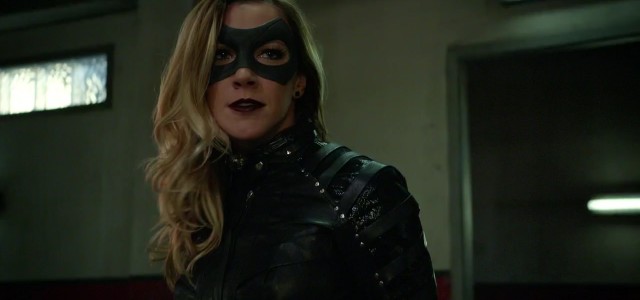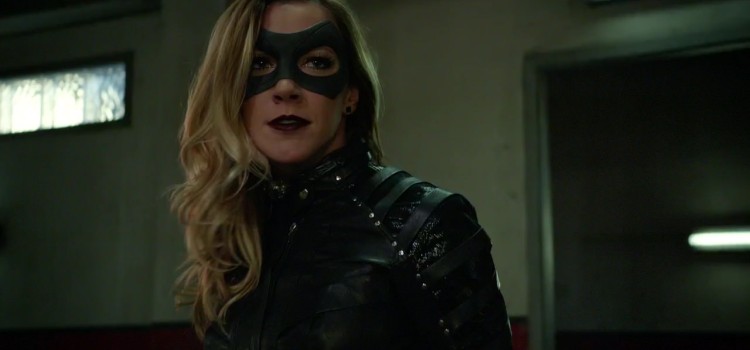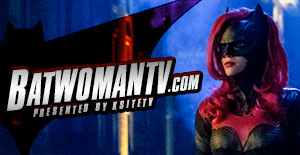


Who’s in the grave? Laurel Lance.
Not a knock-knock joke, but kind of funny. Funny in the sense that they had been prepping Laurel to shuffle off her mortal coil for a few weeks now by writing her better than she’d been written for most of the series, culminating in one of the strongest turns for the character in 4 years. Funny in that it took impending death to realize the asset they had after maligning her in inconsistency for so long. Funny that, in a moment in time where a strong female protagonist — and hero to boot — is a boon, they would jettison one with an established base they could build upon.
In other words, funny in that not ha-ha way.
I held off a few days in writing anything about the turn of events in last Wednesday’s episode because I wasn’t quite sure of the format to approach it. A review of the episode as a whole seemed appropriate, but there are scores of reviews to sift through each week now. A reaction to the main event kept making more sense, and part of that was also getting a lay of the land.
Laurel had her following among the Arrow faithful, to be sure, but it’s fair to say that she wasn’t frequently thought of as a favored character. Surprisingly, for the second lead of the series behind star Stephen Amell, she was also frequently relegated to the background by the show, given some prominent threads here and there to varying effect, but often left in a pool with Thea and Quentin Lance of not knowing what to do with a character for long stretches. It’s not altogether shocking that she would be set forward as the sacrifice this season. If this were a show that had created her from scratch and wasn’t adapted from long-standing source material, it could be argued that her candidacy as the lamb was pretty glaring.
Yet, this was a character with decades of legacy, whether the adaptation matched up to that or not. Black Canary has a following, and the reaction online to this grave choice definitely brought that to the fore. I’d dare say that, even though the execs talked about being prepared for people to be enraged, I don’t know if they quite expected to see as much backlash as they did. Laurel fans crawled out of the woodwork, and not just comic fans who were offended by the concept that the show could just end a well-known character without fully realizing her potential, but avid watchers of the series who had heretofore kept their passion for Laurel relatively quiet.
In a way, one can respect the decision. Though certainly a number of points over four years have made their own stamp, ending the life of a prominent DC hero really does establish this adaptation as its own thing, for good or bad. No matter how much history we the audience might have with the characters these TV counterparts are based upon, the show does have to tell its own story to work.
Where I come down on the side of not appreciating the decision is on two fronts: the short shrift given to the character during her time on the series and the wearing thin tactic of death as a means to tell story and reignite engagement.
Character: Why Laurel died
Dinah Lance and Oliver Queen haven’t always been present in their lives as comic characters, but each plays such prominent roles in the other’s life that they have genuinely become quite inextricable from each other. When the concept of Arrow was presented as a show, it was certainly no surprise that Dinah Lance would live in Starling City. From the beginning, the show was quick to establish this version as their own, most clearly by having her go by her middle name in defiance of her namesake mother who had abandoned the family. In the first season of the show, the creatives were also very clear to say that, despite her comic origins, Laurel wasn’t necessarily destined to become Black Canary. Yet, with the character and the long-form storytelling, how could you not explore that path?
The second season threw a bit of a wrench in the works when they decided to introduce the Black Canary … and she wasn’t Dinah Laurel Lance. Bringing Canary into the show and making her Laurel’s created-for-the-series sister, Sara, was a fairly big slap in the face of those who were invested in seeing Laurel pay her dues and earn her way into the character’s trademark fishnets. This fit a pattern, though. Well, really two patterns. The first was that the show had established this idea of having proto-versions of characters before the real character claimed their mantle. Slade Wilson’s Deathstroke was preceded by former SAS co-hort Billy Wintergreen. Even Oliver was presented with a pseudo-version of the Arrow in Yao Fei on Lian Yu. Sara was designed to be the entry way to send Laurel down her path.
Pattern number two was the show’s tendency to diminish Laurel. Last season, I took a significant amount of grief from portions of the fandom for writing this opinion piece in support of Laurel taking on the Black Canary name and stepping out into the world as a masked vigilante. It created such a hornet’s nest that the GATV site as a whole has been accused of having a bias toward Laurel since, as well as retroactively back to the start of the site.
(Though, let’s be clear here: GATV, even with our prominence and the great relationship we’ve had with the production of the series and the kindness they’ve shown us over the years, is a fansite, first and foremost. We carry ourselves with a fair amount of professionalism because of who were are as individuals contributing to the site, but we aren’t officially connected to the show or the CW or Warner Bros. Television. Just like any fans, we have our likes and our dislikes, and we’ve certainly shared both. Even if we were big Laurel [or Oliver, or Diggle, or Felicity, or Walter Steele] aficionados, as a fansite, how is that a bad thing? We care about the show and have investment in the characters on it.)
Personally, I wasn’t a huge fan of Laurel for the majority of her time on the show. In fact, most of us here weren’t. We wanted to be fans and we wanted the potential of the character to be realized in huge ways. Katie Cassidy had delighted us in previous roles, but something wasn’t quite connecting between her and the writing of the character during that first season. There also seemed to be a chemistry problem with Amell that put a crimp in the side of exploring the romantic aspects of these two characters, something that was a bit disconcerting given the fact that this was Green Arrow and Black Canary, a prominent and stalwart couple in the DC Universe. Worse, though, is that they didn’t seem to know how to give Laurel her own arc and thrust in that first season. She became a prize between Oliver and Tommy and was used primarily as a source of drama for those two.
It was disappointing, and then it was compounded by taking essential aspects of her journey away and giving them to her sister, including a romance between Sara and Oliver that extended to their costumed identities. Laurel’s second year started with a great bit of guilt and anger that turned her into an enemy of “the Hood,” but before they could really milk that for what it was worth, it was over. Set adrift and with little else to do, they gave her an addiction trope that, try as Cassidy could, was frequently written so inelegantly that it never really held the weight nor endeared her to the audience in the way that they had hoped.
Handing her the Canary’s leather jacket to lead into Season 3 was an exciting spark. By no means had she earned it, and thankfully they hadn’t pushed her trying to hit the streets and fight crime during the summer hiatus, but it opened the possibility to such great soil to plant story in for Laurel that it was a welcome sight. Killing Sara off as a motivation for Laurel to pursue her life as Black Canary might have been the easy choice, but it was quite effective. What really worked about it was that they didn’t shy away from Laurel going out in a mask far too soon and getting her ass handed to her. This was something with the character I could sink my teeth into and the potential is what excited me enough to offer that earlier opinion piece. Any complaints about Laurel now had a chance to be washed away in what seemed to promise to be a dedicated and methodical storyarc.
Alas, it wasn’t meant to be. What certainly could’ve helped improve Season 3 was allowing Laurel a far more natural progression of her abilities to be able to stand side-by-side with the other heroes. (Roy and Thea were similarly fast-tracked, unfortunately.) Clunky plotting marred this, and we were given a Black Canary with the spottiest of track records. One episode she could throw down with the best of them, the next she looked like a foreigner thrown into the ring of a lucha libre match who had never see anything of the sort in their life. She was given a few great dramatic beats on the year, but the show was so caught up in trying to figure out what to do with Oliver and the League, as well as pushing the relationship between Oliver and Felicity, that she mostly got lost in the shuffle.
Season 4 had been kind of a mixed bag. They had given Laurel a prominent story in trying to resurrect Sara, though the premise was pretty ghoulish and left Laurel doing somewhat unlikable things to selfishly bring her sister back. (I’m still not sure it was worth undercutting the Season 3 death just to have Caity Lotz available for DC’s Legends of Tomorrow.) Since, though, she’s been a pretty solid utility player. Even more, they took some moments to remind us just how long Oliver and Laurel had been in each other’s lives and what they had meant to one another, even with all the hardship. Some didn’t care for them, but the pep talks Laurel gave to Oliver this year mostly worked for me because you could begin to feel a true sense of history between these two. Their chemistry as friends really began to shine through.
Which should have been the telltale sign. Yes, the death was ruined weeks ago by overzealous paparazzi, but there did seem to be a concerted effort to re-establish this close bond between Laurel and Oliver so that this death could have some true emotional heft to it. And it did.
Despite everything over the years, the conversation between Laurel and Oliver in the hospital room was one of the best on the year. It was hard not to get misty-eyed as Laurel shared with Oliver that she’d kept the picture of her that he’d had with him on Lian Yu. (Also, a good tie-in to the flashbacks in the episode.) And yes, a certain someone choked with emotion as Laurel explained that, reciprocal or not, Oliver was the love of her life. In four years, though they might not have brought to life that iconic romance, Cassidy and Amell have shared some good scenes together and this was in the top tier.
















